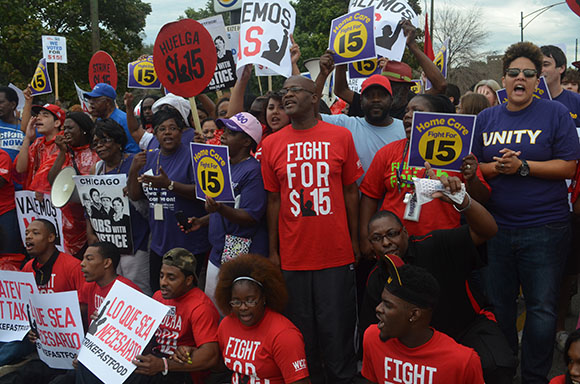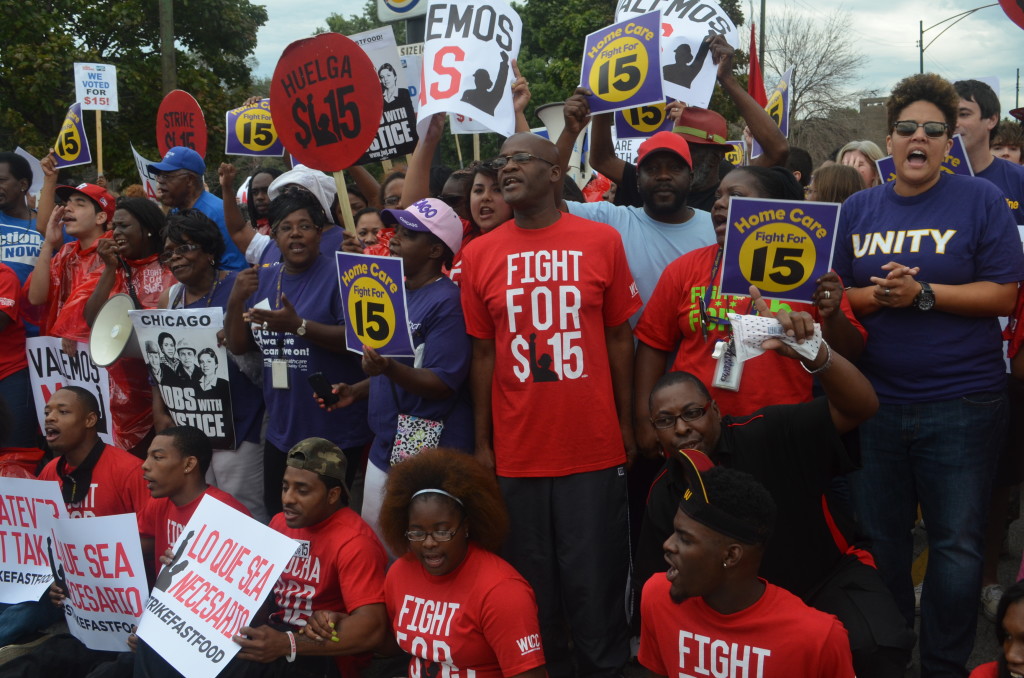Chicago Home Care Workers Join Fast Food Workers in Call for $15 an Hour

 (See incredible TV press coverage below).
(See incredible TV press coverage below).
(Chicago) – The movement for $15 an hour is expanding as home care workers stood with striking fast food workers today on Chicago’s Southside. Echoing calls for $15 and a union, 50 home care workers marched and protested outside the McDonald’s and Burger King at 87th Street and the Dan Ryan Expressway.
“We are inspired by seeing fast food workers standing up and fighting for $15 an hour and the right to form a union without retaliation,” said Tene Smith, a 43-year old home care worker who lives in Englewood. “For me, $15 an hour would mean having to work only one job and being able to better support my family.”
Home care workers in Chicago, Atlanta, Boston, Detroit, and Cleveland decided to join the movement for higher pay and better rights on the job, marking September 4th as part of the growing movement of low-wage workers banding together and calling for an economy that works for everyone.
Our country’s 2.5 million home care providers work hard to care for the elderly and disabled, but too often, do not earn enough to provide basic needs like food, clothing and rent for themselves and their families.
Home care workers provide daily support services like bathing, toileting, dressing, and preparing meals for older Americans and people with disabilities. Home care services are a lifeline that allows hundreds of thousands of Americans to remain living independently at home with dignity.
The average wage for home care workers is just $9.57 per hour. For someone working full-time, that’s $383 a week before taxes, or $1,531 a month, barely enough to cover rent, utilities, food, gas and child care expenses in most parts of the country. But even these figures are high, since they don’t account for the unpredictable and part-time hours that reduce home care wages even further. The result is median annual earnings of just $17,000 a year.
To meet the growing demand for aging baby boomers, nearly 600,000 home care jobs will need to be added to the workforce. While home care jobs are fast-growing, wages remain stagnant and trap the mostly female, minority workforce in poverty.
“I love providing home care and helping people who need me,” explained Anna Howard, a home care worker living in Oak Park who got started caring for her mother at 16 years old until she passed away. “But with part-time hours and low pay I have to look elsewhere for work to support myself. Seniors and people with disabilities need home care workers, but low wages lead to high turnover and that hurts all of us.”
After standing with fast food workers, home care workers joined SEIU Healthcare Illinois members at Trinity All Nations Church in Washington Heights to continue the day of action for higher wages. Workers fanned out in the community registering new voters, and mobilizing residents to pledge their vote to raise the minimum wage on the ballot this November as part of the Raise Illinois coalition.
“As a home care worker, I’m educating my neighbors about how important this election really is this fall,” explained OJ McGee, a single dad who provides home care and works three jobs to support his family. “We’re out here fighting for $15, and turning out the vote for $10.10 this November.”
###
Chicago WGN: Fast Food and Home Care Workers Fight for $15
Chicago CBS 2: Fast Food, Home Care Workers Fight for $15
